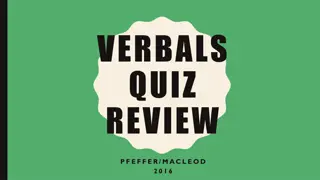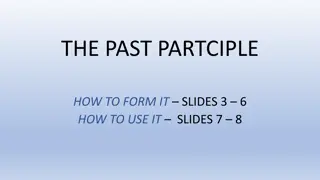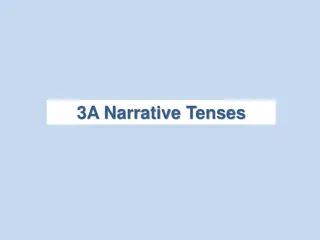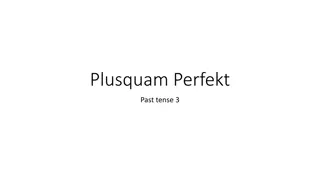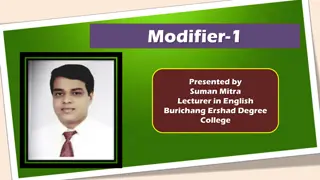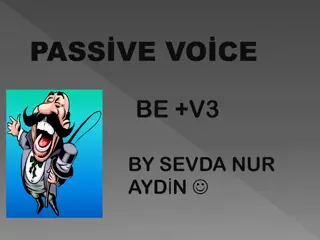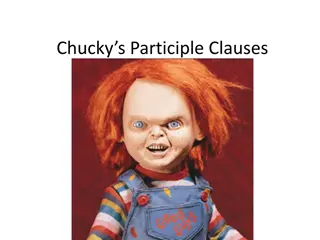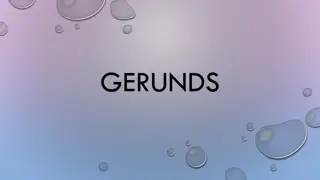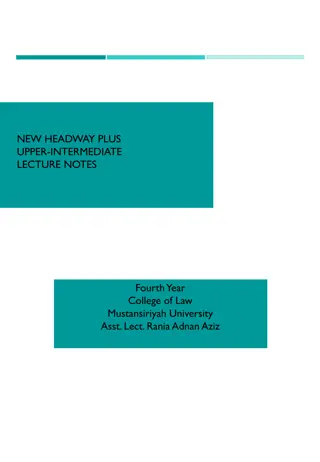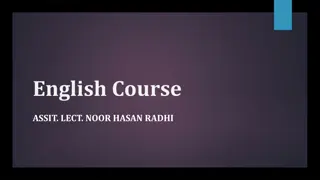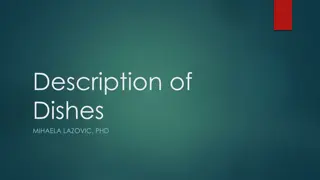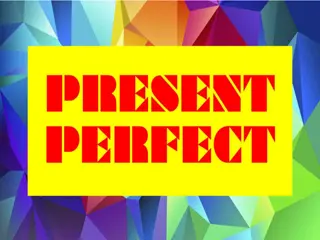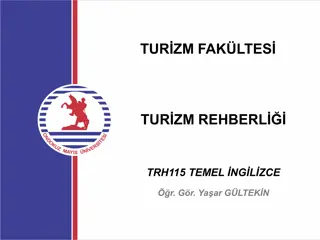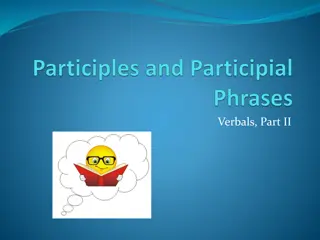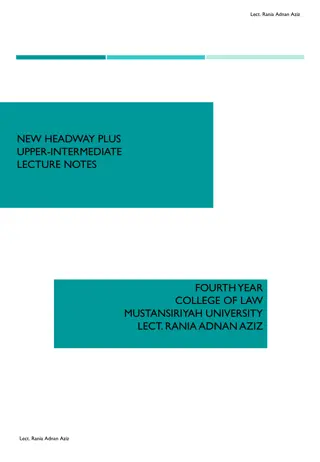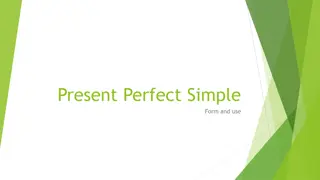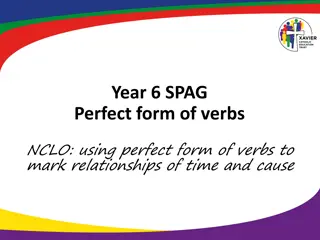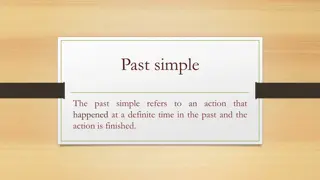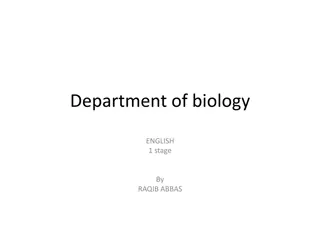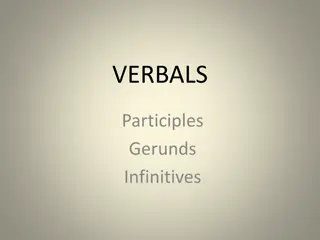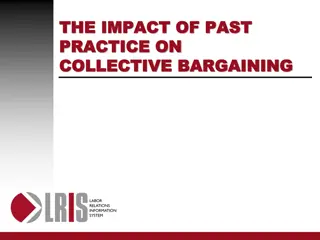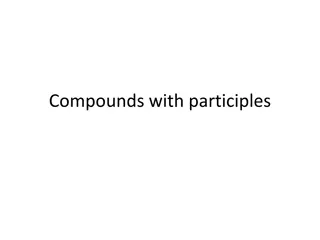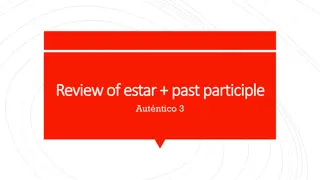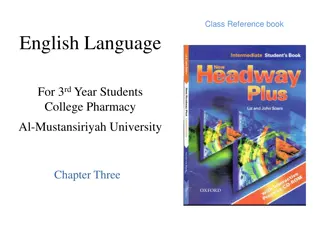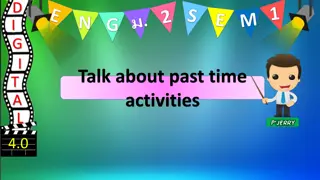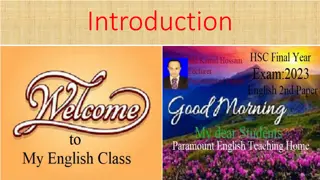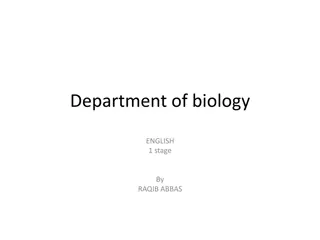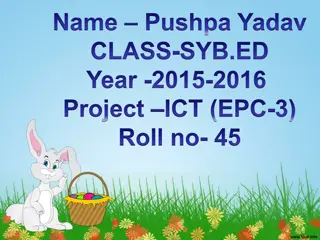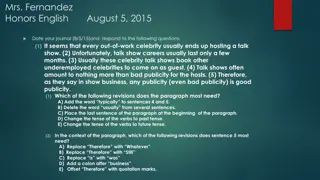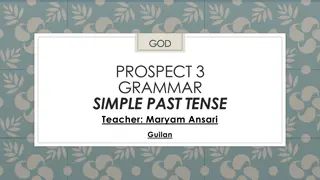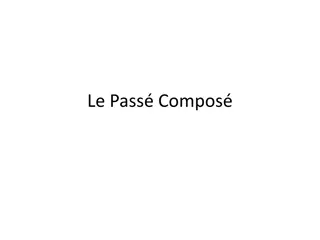Learn Past Continuous Tense - Grade 6 English Lesson
This Grade 6 English lesson focuses on understanding and correctly using the past continuous tense. It covers the rules for forming the past continuous tense, examples of its usage, and an assessment to test comprehension. Students will practice talking about actions happening at specific times in t
4 views • 6 slides
Understanding Verbals: Infinitives, Gerunds, and Participles Quiz Review
Test your knowledge of verbals with this quiz review featuring examples of infinitives, gerunds, and participles. Learn to identify and differentiate between these types of verbals through sentence examples. Enhance your understanding of grammar concepts in a fun and interactive way.
0 views • 21 slides
Mastering the Past Participle in English Verbs
Understand how to form and use the past participle in English verbs, both regular and irregular. Learn the rules for forming regular past participles, including when to double consonants and when to change 'y' to 'i'. Discover examples of irregular verbs and how their past participles are formed. Ex
0 views • 8 slides
Visual Learning Journey through Lesson 65 -ing
Explore lesson 65 on the -ing form through a series of engaging visual slides. Dive into the intricacies of present participles and gerunds, enhancing your understanding of English grammar in an interactive manner.
0 views • 75 slides
Understanding Past Tenses in Narratives
Exploring the use of past simple, past continuous, past perfect, and past perfect continuous tenses in narratives with examples and explanations. Learn how to convey different past events and their relationships in storytelling.
1 views • 4 slides
Understanding Plusquamperfekt Tense in German Grammar
The Plusquamperfekt tense in German is used to refer to actions that happened before another event in the past. This tense requires the past participles of haben and sein, such as hatte, war. Subordinating conjunctions like als, bevor, nachdem are used to establish a timeline of events. Conjunctions
3 views • 4 slides
Mastering the Art of Modifiers in English Language
Explore the rules and examples of pre-modifiers and post-modifiers in English grammar, including modifying nouns with adjectives, determiners, demonstratives, possessives, quantifiers, articles, verb forms, appositives, present participles, and infinitive phrases. Enhance your understanding of how t
0 views • 8 slides
Understanding Active and Passive Voice in English Grammar
Learn about active and passive voice in English grammar with examples, including how to form sentences in different tenses, modal verbs, and the use of past participles. Explore the concept of subjects, verbs, and objects in both active and passive constructions to enhance your language proficiency.
1 views • 31 slides
Mastering Participles: Present and Perfect
Explore the usage of present and perfect participles in English grammar through examples and explanations. Learn how to use present participles for simultaneous actions, expressing reasons, and more. Discover how to transform sentences using participles and perfect participle clauses effectively. En
0 views • 6 slides
Understanding Gerunds: Usage and Examples
Learn about gerunds, their types, and usage in sentences. Discover the differences between gerunds and present participles, along with practical exercises to test your understanding.
0 views • 6 slides
Understanding the Present Perfect Tense in English Grammar
The lecture notes explore the Present Perfect tense, highlighting its connection between past actions and their relevance in the present. It compares the Past and Present Perfect tenses, discussing the nuanced differences and providing examples for clarity. The document covers the usage of the Prese
0 views • 8 slides
Understanding the Past Perfect Tense in English Grammar
The Past Perfect Tense is used to talk about actions completed before a certain point in the past, emphasizing the sequence of events. This tense follows the structure of "had + past participle" and is crucial for expressing events that happened earlier than others in a narrative. Knowing how to for
0 views • 27 slides
Cooking Methods and Dish Descriptions by Mihaela Lazovic, PhD
Mihaela Lazovic, PhD, presents a detailed guide on various cooking methods and dish descriptions. Learn about different culinary techniques, ingredients, and serving styles through her expert insights. Explore recipes such as Homemade Leek and Potato Soup, Creamed Fillet of Beef with Peppers, and mo
1 views • 19 slides
Understanding the Present Perfect Tense Through Examples
Explore the concept of the present perfect tense through various examples and exercises. Learn how to form sentences using "have" and "has" along with past participles, and understand the use of adverbs like "already" and "never." Practice identifying verbs in sentences and answering questions to st
0 views • 17 slides
Understanding Simple Past Tense in English: Rules and Examples
The simple past tense is a fundamental form in Modern English used to describe past events. It involves regular verbs adding "-ed" and irregular verbs having different forms. The construction of the simple past helps distinguish it from other past tense forms like past perfect and past progressive.
0 views • 33 slides
Understanding Participles and Participial Phrases
Learn about participles and participial phrases, which are verbals that act as adjectives. Understand the difference between participles and verbs through examples and practice exercises. Enhance your knowledge of grammar with fun activities and explanations.
0 views • 16 slides
Understanding Narrative Tenses: Past Simple, Present Perfect, and Past Continuous
Explore the nuances of narrative tenses through detailed lecture notes by Lecturer Rania Adnan Aziz. Learn the differences between Past Simple and Present Perfect, grasp the usage of Past Continuous, and understand the significance of Past Perfect in expressing past actions and timelines. Dive into
0 views • 6 slides
Grammar Essentials for 9th Grade English Review
Delve into the key components of sentence structure, including subjects, verbs, and complete thoughts. Explore common errors like fragments, run-on sentences, and comma splices. Learn about phrases, prepositional phrases, participles, and participial phrases, essential for understanding grammar at t
0 views • 17 slides
Understanding the Past Perfect Tense in English Grammar
The past perfect tense expresses actions that occurred before another action in the past, referring to time up to a point in the past. It is often used in reported speech and formal writing to indicate completed actions before a specific event. The past perfect progressive tense emphasizes the durat
0 views • 15 slides
Understanding the Present Perfect Simple Tense and Its Usage
Learn about the basic rules, formation, and usage of the Present Perfect Simple tense in English. Explore how to form the tense, use shortened forms, understand when to use "have" and "has" with past participles, differentiate between Present Perfect and Past Simple, know when to use the Present Per
0 views • 11 slides
Understanding Verb Tenses: Present Perfect and Past Perfect Forms
Explore the usage of present perfect and past perfect verb forms to indicate relationships of time and cause. Present perfect verbs denote actions with undefined past timing but relevance to the present, while past perfect verbs describe events that occurred before another past event. Examples and e
0 views • 7 slides
Learning Le Passé Composé in French
Explore how to recognize, form, and use Le Passé Composé, a tense used to talk about completed actions in the past in French. Discover the two-verb structure, learn about the auxiliary verb "avoir," and master the formation of past participles. Practice identifying when to use Le Passé Composé t
0 views • 9 slides
Understanding the Past Simple Tense in English Grammar
The past simple tense refers to actions that occurred at a specific time in the past and are now completed. This tense follows a specific rule where the subject is combined with a verb (regular or irregular) and a complement. Adverbs like "yesterday," "ago," and "last" are commonly used with past si
0 views • 9 slides
Understanding Past Simple Tense in English Grammar
The past simple tense is used to describe completed actions or events that happened at a specific time in the past. Regular verbs form the past simple by adding "-ed", while irregular verbs have unique past tense forms. The structure for negative and question forms involves the auxiliary verb "did".
0 views • 6 slides
Mastering Verbals: Participles, Gerunds, and Infinitives
Delve into the world of verbals including participles, gerunds, and infinitives. Learn to identify and label these verb forms, understand their functions, and explore how they contribute to the structure and meaning of sentences. Enhance your knowledge of parts of speech and unravel the nuances of v
0 views • 20 slides
Understanding the Impact of Past Practices on Collective Bargaining
Exploring the significance of past practices in interpreting, supplementing, and potentially contradicting contract language within the context of collective bargaining. Covering topics such as the definition of past practices, the duty to bargain, waivers of protest rights, and remedies for unlawfu
0 views • 35 slides
Understanding Compound Adjectives, Verb Patterns, and Infinitive Forms in English Grammar
Explore the structure and usage of compound adjectives formed with participles, verb patterns with gerunds and infinitives, and object combinations in English grammar. Understand how to construct and use these structures effectively in sentences for clear communication.
0 views • 10 slides
Mastering Spanish Past Participles with Estar
Learn how to form past participles in Spanish using estar and how they are used to describe conditions resulting from previous actions. Discover regular and irregular past participles like abierto, puesto, dicho, hecho, and more. Enhance your understanding with examples and improve your Spanish prof
0 views • 4 slides
Understanding Past Tenses in English for 3rd Year College Pharmacy Students
Dive into the intricacies of past tenses in English as you explore the nuances between past simple, past continuous, past perfect, and more. Test your grammar skills while learning to express events that occurred in the past, with a focus on practical application for students at Al-Mustansiriyah Uni
0 views • 25 slides
Exploring Plate Tectonics and the Scientific Method
Dive into the world of plate tectonics and the scientific method in this lesson. The session covers vocabulary and grammar review, giving and receiving feedback, learning new concepts related to plate tectonics, and understanding participles and participial adjectives. Explore the theory of plate te
0 views • 8 slides
Talking About Hobbies: Likes, Frequency, and Preferences - English
Explore various expressions for talking about past time activities, expressing likes and dislikes, discussing hobbies, and sharing preferences in free time. Learn how to use adverbs of frequency and descriptive participles to convey how often and why you enjoy your hobbies. Discover common hobbies,
0 views • 19 slides
Understanding Premodifiers in English Grammar
Exploring the various types and uses of premodifiers in English grammar. Learn how predeterminers, determiners, present participles, past participles, adjectives, and nominal compounds function as premodifiers in sentences. Enhance your knowledge of premodification to improve your language skills.
0 views • 6 slides
Understanding Past Perfect Tense in English Grammar
Past Perfect Tense is used to denote actions that were completed before another action occurred in the past. It is formed using the auxiliary verb "had" followed by a past participle. Examples of affirmative, negative, and question forms are provided to illustrate usage. The tense helps in sequencin
0 views • 4 slides
Common Regular Verbs and Their Past Tenses
Common regular verbs and their past tenses are essential aspects of grammar learning. Past tense forms of verbs are used to indicate actions or states that have already occurred. Examples of regular verbs and their corresponding past tenses are provided in this content, along with spelling rules for
0 views • 17 slides
Understanding Phrases and Participles in English
Learn about different types of phrases, such as prepositional and appositive phrases, their functions in sentences, and how to correctly identify and use them. Practice identifying and correcting misplaced and dangling participles. Includes examples and explanations to enhance understanding of these
0 views • 11 slides
Understanding Verb Forms: Lessons and Exercises
Enhance your knowledge of English verb forms through lessons and exercises on identifying, using, and conjugating verbs correctly. Learn about irregular verbs, past participles, and more, to improve your language skills.
0 views • 18 slides
Understanding Simple Past Tense in Grammar
In this file, we delve into the concept of simple past tense in grammar. Through examples and explanations, you will learn how to use the simple past tense to talk about completed actions in the past. The structure, usage, and importance of simple past tense are covered extensively to enhance your u
0 views • 30 slides
Events and Reminders: Detroit Cider Festival, Conversation Class, and Library Vocabulary
Explore upcoming events like the Detroit Cider Festival at Beacon Park, a conversation class reminder, and enrich your vocabulary with library terms. Also, learn about causative sentences, past participles, and map exploration activities. Interpret advertisements and find out where to discover them.
0 views • 9 slides
Mastering Le Passé Composé: French Verb Conjugation Guide
Understand how to form and use Le Passé Composé in French with this comprehensive guide. Learn about subject-verb agreement, irregular past participles, verbs using "être," and more. Enhance your French language skills and confidently express past actions.
0 views • 15 slides
Understanding Modifiers in English Grammar
Exploring the concept of modifiers in English grammar, this content covers the definition of modifiers, types based on position and modified words, common terms used as modifiers such as determiners, adjectives, adverbs, and participles. Gain insights into pre-modifiers, post-modifiers, and how modi
0 views • 12 slides

